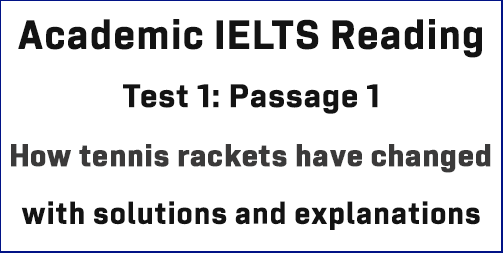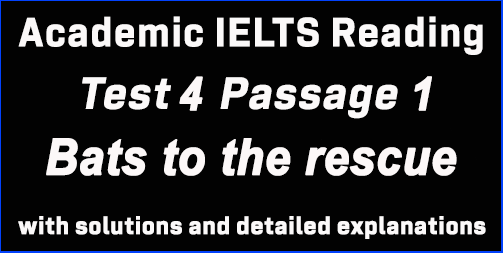IELTS Academic Reading: Cambridge 7, Test 3: Reading Passage 1; Ant Intelligence; with top solutions and detailed explanations
This IELTS Reading post focuses on all the solutions for IELTS Cambridge 7 Test 3 Reading Passage 1, which is entitled ‘Ant Intelligence’. This is a targeted post for IELTS candidates who have great problems in finding answers for the Academic Reading module. This post can guide you the best to comprehend each Reading answer without facing much difficulty. Tracing IELTS Reading answers is a gradual process and I sincerely hope this post can help you in your IELTS Reading preparation.
IELTS Cambridge 7 Test 3: AC Reading Module
Reading Passage 1:
The headline of the passage: Ant Intelligence
Questions 1-6: TRUE, FALSE, NOT GIVEN
[In this type of question, candidates are asked to find out whether:
The statement in the question matches with the account in the text- TRUE
The statement in the question contradicts the account in the text- FALSE
The statement in the question has no clear connection with the account in the text- NOT GIVEN
[For this type of question, you can divide each statement into three independent pieces and make your way through with the answer.]
Question 1: Ants use the same channels of communication as humans do.
Keywords for the question: ants use, same channels of communication, as humans,
At the beginning of paragraph no. 2 the writer says, “Ant store food, repel attackers and use chemical signals to contact one another in case of attack. Such chemical communication can be compared to the human use of visual and auditory channels (as in religious chants, advertising images and jingles, political slogans and martial music) to arouse and propagate moods and attitudes.”
This means ants use chemical signals while humans use visual and auditory channels which are not similar but they can be compared.
So, the answer is: FALSE
Question 2: City life is one factor that encourages the development of intelligence.
Keywords for the question: city life, factor, encourages, development of intelligence,
In paragraph no. 7, the writer mentions about the impact of city life in developing intelligence, “Whereas prehistoric man had no exposure to urban lifestyles – the forcing house of intelligence – the evidence suggests that ants have lived in urban settings for close on a hundred million years … . . . .”
Here, urban lifestyles = city life, the forcing house = factor that encourages the development,
So, the answer is: TRUE
Question 3: Ants can build large cities more quickly than humans do.
Keywords for the question: ants, can build, large cities, more quickly, than humans,
In paragraphs no. 7 and 8, the author talks about building cities by ants and humans. However, there is no comparison on whether ants build large cities more quickly than humans or not.
So, the answer is: NOT GIVEN
Question 4: Some ants can find their way by making calculations based on distance and position.
Keywords for the question: some ants, find, way, making calculations, based on, distance, position,
In paragraph no. 11, the author mentions in lines 1-6, “Research conducted at Oxford, Sussex and Zurich Universities has shown that when desert ants return from a foraging trip, they navigate by integrating bearings and distances, which they continuously update in their heads.”
Here, navigate = find their way, integrating = assimilate/making calculations, bearings and distances = distance and position,
So, the answer is: TRUE
Question 5: In one experiment, foraging teams were able to use their sense of smell to find food.
Keywords for the question: one experiment, foraging teams, able to use, sense of smell, find food,
In paragraph no. 12, we can find the mention of ‘the experiment’. Here, in lines 11-12, the writer mentions, “. . . Elaborate precautions were taken to prevent the foraging team using odour clues.”
The line suggests that necessary actions were taken before to stop the foraging team to use odour (sense of smell).
So, the answer is: FALSE
Question 6: The essay, ‘In the company of ants’, explores ant communication.
Keywords for the question: essay, In the company of ants, explores, ant communication,
The last paragraph gives reference to the essay ‘In the company of ants’. The writer says here, in lines 5-9, “It’s no surprise that Edward Wilson, in his essay, ‘In the company of ants’, advises readers who ask what to do with the ants in their kitchen to: ‘Watch where you step. Be careful of little lives.’”
Here, the writer of the essay ‘In the company of ants’ advises us to be careful and not to step on the little creatures. However, the line doesn’t indicate anything about the subject of the essay.
So, the answer is: NOT GIVEN
Questions 7-13: (Summary completion with list of words)
(In this kind of questions candidates are given a summary for one, two or three paragraphs with some fill in the blanks questions form a list of words given in a box. Candidates need to find out the related paragraphs by correctly studying the keywords form the questions. Then, they should follow the steps of finding answers for fill in the gaps and write the correct letter corresponding to the answer.)
The title of the summary: Ants as farmers
All the answers are found in paragraph D.
Question 7: Ants have sophisticated methods of farming, including herding livestock and growing crops, which are in many ways similar to those used in human agriculture. The ants cultivate a large number of different species of edible fungi which convert ________ into a form which they can digest.
Keywords for the question: sophisticated methods of farming, herding livestock, growing crops, similar, human agriculture, cultivate, large number, different species, edible fungi, convert, can digest,
In paragraph no. 5, the author states in lines 2-6, “Ants can’t digest the cellulose in leaves- but some fungi can. The ants, therefore, cultivate these fungi in their nests, bringing them leaves to feed on, and then use them as a source of food.”
So, the answer is: C (cellulose)
Questions 8 and 9: They use their own natural 8. ___________ as weed-killers and also use unwanted materials as 9. _________.
Keywords for the question: use, own, natural, weed-killers, unwanted materials,
Again, in paragraph no. 5, in lines 6-9, the author says, “ . .. Farmer ants secrete antibiotics to control other fungi that might act as ‘weeds’, and spread waste to fertilise the crop.”
Here, to control other fungi that might act as ‘weeds’ means weed killers, unwanted materials = waste,
Now, the word ‘use’ before question no. 8 and the word ‘spread’ before question no. 9 restrict us to use the word ‘secrete’ and ‘fertilise’, because they don’t fit here grammatically.
So, the answers are:
- M (secretions)
- F (fertilizers)
Question 10: Genetic analysis shows they constantly upgrade these fungi by developing new species and by ________ species with neighbouring ant colonies.
Keywords for the question: genetic analysis, constantly upgrade, fungi, developing, new species, neighbouring ant colonies,
In paragraph no. 6 line no. 6 we find the word ‘genetically’ that matches with keywords ‘genetic analysis’. So, we need to scan this paragraph carefully.
In lines 7-13, the writer says, “. . . . These turned out to be highly diverse: it seems that ants are continually domesticating new species. Even more impressively, DNA analysis of the fungi suggests that the ants improve or modify the fungi by regularly swapping and sharing strains with neighbouring ant colonies.”
Here, upgrade = improve or modify, exchange = swapping and sharing,
So, the answer is: D (exchanging)
Questions 11, 12 & 13: In fact, the farming methods of ants could be said to be more advanced than human agribusiness, since they use 11. ________ methods, they do not affect the 12. _______ and do not waste 13. ________.
Keywords for the question: farming methods of ants, more advance than, human agribusiness, they use, methods, do not affect, do not waste,
These questions give a clear hint to the comparison of farming methods between humans and ants. So, we need to go to paragraph no. 4, where the comparison of farming methods between humans and ants can be found. In lines 1-4 of this paragraph, the writer says, “The farming methods of ants are at least sustainable. They do not ruin environments or use enormous amounts of energy.”
Here, The farming methods of ants are least sustainable = they use sustainable farming methods, do not ruin = do not affect/do not waste,
So, the answers are:
- N (sustainable)
- O (environment)
- E (energy)
Click here for solutions to Cambridge 7 Test 3 Reading Passage 2
Click here for solutions to Cambridge 7 Test 3 Reading Passage 3




Thanks a lot dear Authors!!